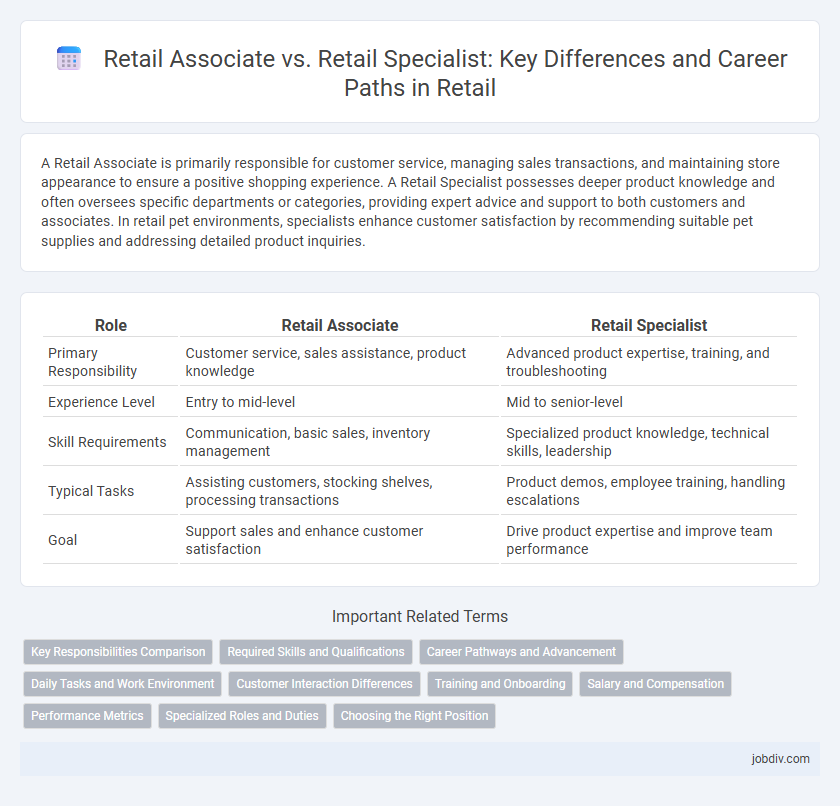A Retail Associate is primarily responsible for customer service, managing sales transactions, and maintaining store appearance to ensure a positive shopping experience. A Retail Specialist possesses deeper product knowledge and often oversees specific departments or categories, providing expert advice and support to both customers and associates. In retail pet environments, specialists enhance customer satisfaction by recommending suitable pet supplies and addressing detailed product inquiries.
Table of Comparison
| Role | Retail Associate | Retail Specialist |
|---|---|---|
| Primary Responsibility | Customer service, sales assistance, product knowledge | Advanced product expertise, training, and troubleshooting |
| Experience Level | Entry to mid-level | Mid to senior-level |
| Skill Requirements | Communication, basic sales, inventory management | Specialized product knowledge, technical skills, leadership |
| Typical Tasks | Assisting customers, stocking shelves, processing transactions | Product demos, employee training, handling escalations |
| Goal | Support sales and enhance customer satisfaction | Drive product expertise and improve team performance |
Key Responsibilities Comparison
Retail Associates primarily handle customer service, product stocking, and maintaining store cleanliness, ensuring a smooth shopping experience. Retail Specialists focus on in-depth product knowledge, specialized sales techniques, and often manage inventory control or training. Both roles contribute to sales growth, but Specialists typically engage in higher-level customer interactions and strategic tasks.
Required Skills and Qualifications
Retail Associates require strong customer service abilities, basic sales knowledge, and effective communication skills to assist shoppers and process transactions efficiently. Retail Specialists demand advanced product expertise, inventory management experience, and proficiency in merchandising strategies to optimize store performance. Both roles benefit from teamwork, problem-solving skills, and adaptability in a fast-paced retail environment.
Career Pathways and Advancement
Retail Associates typically serve as entry-level employees focusing on customer service, inventory management, and sales support, providing a foundational experience essential for career growth in retail. Retail Specialists possess advanced product knowledge and technical skills, positioning them for roles with increased responsibilities such as merchandising, training, or supervisory positions. Career pathways from Retail Associate to Retail Specialist often involve skill development, certifications, and demonstrated performance, paving the way for advancement into management or specialized retail fields.
Daily Tasks and Work Environment
Retail Associates primarily handle customer service duties such as assisting shoppers, restocking merchandise, and operating cash registers in fast-paced store environments. Retail Specialists focus on inventory management, product expertise, and training staff, often working closely with management to optimize sales strategies. Both roles require strong communication skills and adaptability but differ in scope, with Specialists taking on more technical and supervisory responsibilities within retail operations.
Customer Interaction Differences
Retail Associates primarily engage in direct customer service, handling sales transactions and addressing basic inquiries to ensure a smooth shopping experience. Retail Specialists possess deeper product knowledge and provide tailored advice, guiding customers through more complex purchasing decisions and troubleshooting. These distinct roles highlight a spectrum of customer interaction, with Specialists offering expert assistance and Associates facilitating general support.
Training and Onboarding
Retail Associates undergo foundational training that emphasizes customer service, product knowledge, and basic sales techniques to effectively support day-to-day store operations. Retail Specialists receive advanced onboarding focused on in-depth product expertise, inventory management, and specialized sales strategies to drive higher customer engagement and sales performance. Both roles include ongoing training programs, but specialists benefit from targeted development to address complex retail challenges and optimize store performance.
Salary and Compensation
Retail Associates typically earn an average hourly wage between $12 and $16, depending on location and experience, while Retail Specialists often receive higher compensation, ranging from $15 to $22 per hour. Retail Specialists may also benefit from better commission structures and performance incentives, reflecting their advanced skills and responsibilities. Salary variations are influenced by company size, regional market rates, and specific retail sectors such as electronics or luxury goods.
Performance Metrics
Retail Associates are often evaluated based on direct customer interaction metrics such as sales volume, customer satisfaction scores, and transaction efficiency. Retail Specialists typically measure performance through product knowledge accuracy, upselling rates, and inventory management effectiveness. Both roles contribute to overall store performance but emphasize different key performance indicators tailored to their responsibilities.
Specialized Roles and Duties
Retail Associates primarily handle direct customer interactions, assisting with sales, inventory management, and basic product knowledge. Retail Specialists possess in-depth expertise in specific product categories, offering advanced guidance and solving complex customer inquiries. Their specialized roles enhance store performance by driving targeted sales and improving customer satisfaction through expert advice.
Choosing the Right Position
Retail Associates excel in customer service, handling transactions, and maintaining store appearance, making them ideal for entry-level roles focused on direct customer interaction. Retail Specialists possess advanced product knowledge and expertise, enabling them to assist with complex sales, inventory management, and staff training, suited for those aiming for higher responsibility within retail operations. Choosing the right position depends on your career goals, skill level, and interest in product specialization or general customer service tasks.
Retail Associate vs Retail Specialist Infographic

 jobdiv.com
jobdiv.com